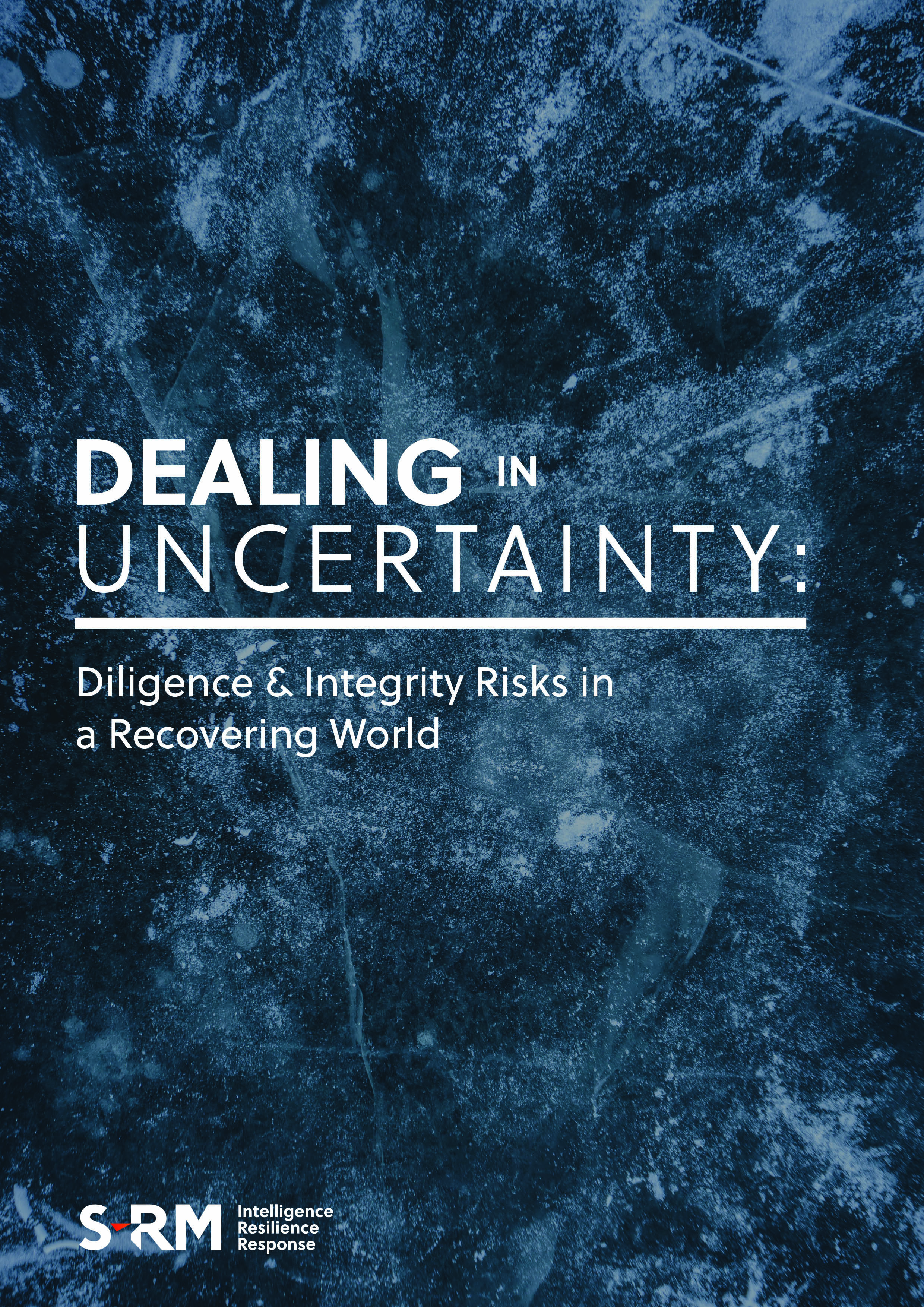Will COVID-19 increase or reduce public scrutiny on corruption and transparency issues?
To what extent have the values underpinning transparency, corporate accountability and good governance been compromised by the urgency of the crisis? What impact will that compromise likely have on the trust civil society places on both the private sector and public institutions? We recently brought together a panel of experts to discuss this and other pertinent questions relating to the integrity concerns likely to emerge in the wake of the global pandemic.
Our panel included:

Duncan Hames Director of Policy As Director of Policy, Duncan takes a strategic lead on UK focused work, building on TI-UK’s efforts to end the UK’s status as a ‘safe haven’ for corrupt money, address corruption in the political sphere, as well as navigate new areas of work. He joined TI-UK after working on information security with Templar Executives, following 5 years as a Member of Parliament. He also serves on the board of the South London and Maudsley NHS Foundation Trust, where he chairs their audit committee. |

Kristen Stone Director, S-RM (New York)
Kristen has led investigations into bribery, corruption, fraud, and corporate transparency issues for the past 8 years: both for the private sector in her intelligence and investigations work at S-RM, and in the public interest in her previous experience as a journalist in Moscow, Russia. Her reporting and analysis has been featured by BBC, the Sunday Times, and BuzzFeed. She holds a Bachelor of Arts degree in Political Science and Russian from the University of Notre Dame. |

Blair Glencorse Founder & Executive Director, Accountability Lab (Pakistan) Blair is an expert on anti-corruption with the World Economic Forum; the Lead of the Anti-Corruption Working Group of the C20; and a member of the World Bank’s Expert Advisory Council on Citizen Engagement. The Accountability Lab makes governance work for people everywhere by supporting active citizens, responsible leaders, and accountable institutions. The Accountability Lab is a winner of the UN’s International Anti-Corruption Excellence Award. Blair is a 2014 Echoing Green Fellow. |

Henry Williams Head of Investigations, Themis (London)
Henry has 14 years’ experience as an investigator and journalist and has led teams working on some of the largest corporate investigations to be prosecuted over the last decade. Prior to Themis, Henry worked as a consultant to the financial investigations industry. His investigations have been published in the New Statesman, the Bureau of Investigative Journalism and the Evening Standard. He has an MA in International Journalism from City University. |
Where should we be looking?
The urgent nature of a crisis inevitably creates blind-spots, and these generate opportunities for corrupt practices. Yet, as much of the world faces unchartered territory in responding to the COVID-19 pandemic, what these blind-spots are, and where to find them, may not be immediately apparent. This raises the question: where should we be looking today to anticipate the integrity and corruption issues of tomorrow?
According to Hames, before looking ahead we need to ensure we achieve adequate levels of transparency today. Doing so will help us establish a ‘forward-looking accountability tool’.
‘Making sure we have good transparency about transactions that are conducted now will enable accountability later. In the context of a crisis, it’s very important that we should defend and strengthen existing accountability mechanisms because during the crisis there’s little opportunity to develop and mobilise new ones.’
Glencorse concurs, pointing out that corruption is in fact a part of, not just a consequence of, the current crisis. He recounts how systematic corruption contributed to the virus’s spread to his current base of operations, Pakistan:
‘The spread of the coronavirus in Pakistan came from Iran, because some pilgrims who were at a camp on the border with Iran bribed the border guards to get in, and then spread out across the country, spreading the coronavirus with them’.
Both Hames and Glencorse list a number of focus areas which they will be watching over the course of the pandemic, and beyond, in terms of their respective anti-corruption efforts. These include:
Share to LinkedIn
On governance and trust
The COVID-19 pandemic has certainly seen the re-emergence of the nation state as a singular power, superseding powerful global business networks. Around the world, states of emergency have been declared and unprecedented steps taken to quell the spread of the virus, including almost complete shutdown of economic activity and travel in many cases. It is therefore unsurprising that serious questions are being raised about who is overseeing the overseer.
For example, in the UK parliament was held virtually for the first time in its 700 year history, and has since reconvened in a slimmed-down and socially-distanced fashion. Yet operating in this way will likely impact the public’s ability to fully scrutinise government action. Under these conditions, says Hames, ‘although the parliamentary select committees are able to get on with a lot of their work, this may not necessarily be done as publicly as before’. He further notes that passing legislation will be very difficult under this environment:
‘We understand from government officials that we shouldn't expect any legislation other than that which is directly related to COVID-19 during the course of this calendar year’.
He also points to the calculations that go into when, where and how politicians are making critical announcements regarding the pandemic. ‘There’s a long history of previous administrations, of different colours, not making critical announcements in the House of Commons and finding other platforms to do so,’ he says. In the House of Commons, speakers have to ‘share a platform with their critics’ making it far more difficult to control the message. COVID-19 offers political leaders a reason to avoid that level of debate. Still, Hames believes that in the UK, with its ‘established, healthy and robust public discourse’, there will be ample avenues for challenging misconduct and governance failures. This is unlikely to be the case, however, in a number of emerging economies with a far weaker tradition of oversight and public scrutiny.
Drawing on his past experience working in Liberia during the Ebola outbreak, for example, Glencorse recalls how the awarding of contracts to government cronies was commonplace. ‘There were lots of shortages of equipment that could and should have been there,’ he says, ‘but they weren’t because they went missing. Meanwhile some public hospitals would have absolutely nothing, whereas private health clinics had more than enough’.
A history of poor governance in Liberia has resulted in deep levels of mistrust among the population, a mistrust which makes the response to an outbreak all the more difficult. Glencorse remembers how, during the Ebola outbreak, Liberia’s citizens simply did not believe government communications regarding the disease. ‘They had never really seen a government that had served its citizens,’ he says, ‘so when the government said “don't touch each other, there's this thing called Ebola” everyone thought that they were making that up to steal money from the international community.’
He witnessed a similar phenomenon while working in Nepal following the earthquake in 2015:
‘The government was sending out communications about what should happen and how people could apply for support, but people didn't trust them.’
The result is a vicious cycle, in which repeated gross failures of governance lead to levels of disillusionment so high that the affected population responds with incredulity to legitimate offers of support. Indeed, even in developed economies, the proliferation of misinformation has led to widespread confusion, suspicion and, in some cases, curtailed efforts towards a more coordinated response to the pandemic. It also sows mistrust in the media and, with it, their efforts to uncover instances of corruption.
In the headlines
The media and the free press continue to play a key role holding corrupt individuals to account globally.
‘As a journalist,’ Williams says, ‘you’re always taught to make the story people-centric.’ He notes that with COVID-19, corruption is having a visible impact on people, which is likely to resonate strongly with members of society: ‘I think with the pandemic, you’ll be able to see corruption really affecting people, particularly if it’s denying funds to health services’.
He identifies the upcoming US elections as another likely flashpoint for close media scrutiny of corrupt practices:
'I think Joe Biden is going to use corruption and COVID-19 supply chains as an attack vector against Donald Trump. You’re already seeing this in his campaign when he talks about cronyism. Trump has got strong ties to pharmaceutical companies receiving contracts, and we’ve seen Trump’s cronies receiving lots of money from the payment protection programme. So that's one particular instance where I think this conversation is going to move beyond the theoretical and almost academic, and right into the media spotlight.’
Commenting from New York, Stone agrees. ‘It’s fair to say there is quite a bit of scrutiny being placed on the money that's being awarded and where it's going,’ she says. ‘The US media, on both sides, both liberal and conservative coverage, are putting a great deal of pressure on companies and the government to be really transparent about who is receiving funds and contracts’.
Nevertheless, she notes that the sheer volume of information at hand inhibits the depth of media scrutiny on these matters. This includes, for example, thousands upon thousands of ‘COVID-19 related contracts’ that have already been awarded, only months into the pandemic.
‘There’s a lot of great work that has been done by journalists already on some of the largest contracts,’ she observes, ‘but I think there is still a lot that we don’t know, and a lot that is going to come out later with a bit of time and the benefit of hindsight’. Indeed, even if journalists and investigators are unable to wade through the reams of information documenting the awarding of contracts and other procurement practices, Stone believes that as long as that information is being scrupulously collected in the first place, scrutiny and prosecutions will be able to follow ‘after the fact’.
Beyond the attention placed on the elections, Williams considers the media response to uncovering corrupt practices amid the pandemic to be ‘positive’. ‘We’ve already seen that, even in places where it’s very dangerous to be a journalist’, he says, ‘there has been some very good reporting on government cronies receiving contracts because of coronavirus’.
As a case in point, the Organized Crime and Corruption Reporting Project, has covered stories ranging from the procurement of poor-quality protective gear from an organised crime affiliate in Romania to investigations in Colombia regarding ‘contract irregularities linked to’ the country’s COVID-19 response involving government officials.
Speed versus scrutiny: Critical trade-offs in an economic recession
Preventing and identifying instances of financial crime and misconduct is particularly challenging during economic recessions. During such periods, the incentive to closely scrutinise the source or destination of funds is significantly diminished in favour of facilitating a rapid economic response.
According to Stone, the public is aware of the government’s need to strike a balance between ‘acting quickly and proceeding carefully’, because - in the midst of a pandemic - the impact of acting too slowly could be fatal. ‘If the government is getting bogged down in gathering excessive documentation and processing loads of checks,’ she says, ‘then the emergency aid and the medical supplies are not going to get where they need to go.’
With the mounting economic consequences of the pandemic being felt among swathes of the population, it is likely that there will be a broad-based acceptance of prioritising speed over scrutiny, not just in terms of procuring emergency supplies, but also to revitalise the economy.
‘I think that a lot of regulations are going to be almost set aside’, says Williams, ‘certainly, for instance, in financial services, while businesses try and get back on their feet.’ Hames agrees. ‘This will be a much riskier environment for tackling financial crime. There'll be the inevitable pressure to cut red tape, to make life easier for businesses under pressure.’ He summarises the trade-off as follows:
‘How does an economy which is desperate for inward investment in order to lift itself out of an economic depression safeguard against dirty money?’
Desperate times call for desperate measures, and with governments vying for foreign investment to boost their ailing economies, will they be scrutinising these funds with as much rigour as they would do under favourable economic conditions? ‘You're going to have people pushing for more money to come into the country, in whatever shape that can take,’ says Williams, ‘and I think, especially in a global crisis, that's going to be a huge problem.’
Businesses, too, will likely be prone to greater risk-taking in this regard. ‘At the end of the day,’ says Hames, ‘if a business faces going to the wall, it's going to take risks. It's going to find it very difficult to turn away business, which perhaps, with a cool head, in other times - and recognising the importance of crime, law and order, and also its own reputation - it would have declined.’
Likewise, in developing countries, where already vulnerable populations have been plunged into financial insecurity due to economic shutdowns, the pressure to get business back up and running will be vast, as will opportunities for financial crime. ‘We're going to see a lot of companies cutting corners,’ says, Glencorse, ‘and making decisions that they wouldn't have otherwise made in order to stay alive.’ Pressure will also mount on governments to loosen regulations, open up their economies and deploy significant funds to support critical businesses. All this will ‘increase the government’s role in company ownership and the development of state-owned enterprises (SOEs),’ he notes, bringing with it ‘all sorts of issues around accountability and corruption with SOEs and political influence.’
Who will take the lead on policy and enforcement?
The numbers are already painting a concerning picture. Both illicit financial flows and ‘the amount of money being laundered’ are increasing, Glencorse observes. So how will regulatory authorities respond?
‘On the regulatory policy side,’ Stone says, ‘in the US there are special provisions that are being set up specifically for oversight of funds being awarded under the CARES Act, which is the US’s main coronavirus relief package.’ The CARES Act establishes a special inspector general for pandemic recovery that can conduct its own investigations and refer matters to the Department of Justice. Work is also being done by a group of anti-corruption NGOs who are backing a number of bills for inclusion in future COVID-19 response packages, notes Glencorse. Amongst these are the Countering Russian and Other Overseas Kleptocracy Act (CROOK), as well as the Foreign Extortion Prevention Act, The Kleptocrats Exposure Act and the Justice for the Victims of Kleptocracy Act.
In the UK, Hames is keeping an eye on the Corporate Governance and Insolvency Bill which, while it may not focus on financial crime per se, is likely to prompt calls to implement the results of the government’s consultation on registry reform for Company’s House.
On the enforcement side, Stone observes that ‘the US Department of Justice is prioritising the prosecution of COVID-19 related fraud cases at the moment.’ She therefore anticipates a short term ramp up in such cases in the US, which also means that other types of prosecutions may get delayed.
Travel restrictions will also likely have a delaying impact on enforcement, including prosecutions of Foreign Corrupt Practices Act (FCPA) violations. ‘The current restrictions on global and domestic travel mean that industry investigators can't hop on a plane to conduct interviews and gather evidence,’ says Stone. This will likely lead to fewer FCPA cases brought over the next year, and possibly see the US Department of Justice declining to take on lower priority cases because of limitations on their bandwidth.’
The US’s role as a global leader in terms of anti-corruption drives is also under threat given the recent politicisation of anti-corruption investigations. Although the US boasts ‘extremely powerful and fairly independent law enforcement bodies’, Stone notes that anti-corruption investigations ‘don’t seem to be a priority for the current US administration, and President Trump has in fact heavily criticised the FCPA.’ She points to the US’s withdrawal from the Extractive Industries Transparency Initiative (EITI), which is a global standard for accountability and transparency in the oil, gas and minerals sector, as an example. This amongst other actions by the Trump administration, she argues, has seen the US’s credibility as a leader in anti-corruption efforts decline.
And in its stead? Hames does not see the EU stepping in , although there has been some notable progress in its anti-corruption efforts. ‘On money laundering,’ he observes, ‘there’s been some renewed vigour in the EU, and that’s having a knock-on implication in terms of global standards in other financial centres’. As an example, he points to the stated intent by the Isle of Man, Jersey and Guernsey in 2019 to align with the EU’s Fifth Anti Money Laundering Directive - which will see them move towards a public register of beneficial ownership for companies – ‘even though they’re not legally required to do so’. The Cayman Islands subsequently followed suit.
Although the gap left by the US in this regard will be too big to fill by the likes of the EU, there are a number of bright spots. For example, Stone notes that the US Congress has been presented with two separate bills, The Corporate Transparency Act and the ILLICIT Cash Act, focused on improving corporate disclosure requirements for companies that are based in the US. Hames also sees the FCPA’s historically business-friendly positioning as a positive.
‘The FCPA protects businesses from having to pay bribes oversees. And there's definitely a pro-business narrative around policy and enforcement in this area, which isn't being delivered by the fiscal leadership at the moment. It is worth remembering that the global leadership from the US on anti-corruption was itself an effort to create a level playing field for US businesses. So there is a fundamental incentive for the likes of the UK and US to project global standards on anti-corruption internationally’.
Looking back, and looking forward
One way or another, the current crisis will subside. When it does, authorities will be faced with the task of balancing present-day caseloads with an imperative to look back and scrutinise past action which may have been overlooked in the height of the pandemic.
‘This brings us back to the “too big to fail” debate around deferred prosecution agreements (DPAs)’, says Hames. With DPAs, prosecutions of a violation are deferred as part of a negotiated agreement in which the defendant is required to meet certain obligations. Hames expects that these will become more common in the current environment. ‘That’s not necessarily a problem,’ he points out, ‘as long as the criteria for earning a DPA is held to, in that it is a result of self-reporting’. In the midst of a crisis and economic recession, he anticipates relative public sympathy for efforts to avoid ‘bringing down companies that have had the good sense of finding corruption within their organisation and self-reporting it to law enforcement.’
Williams adds that the IMF has begun introducing post-loan audits in several of the countries it is funding. He expects post-loan audits to become more commonplace in general. ‘European countries especially have dropped normal procurement guidelines, as speed is of the essence now,’ he says, ‘so I think you’ll have similar post-loan audits taking place there as well.’
In the US, Stone believes that investigations into fraudulent support package applications will likely form part of the crisis retrospective. ‘Company applicants to the payroll protection programme have to make certain certifications about the fact that they have been put into distress by the pandemic,’ she says, ‘and disclose some information about their beneficial ownership alongside other aspects of their business.’ Although banks are not checking these applications as vigorously as they might otherwise do, in an effort to expedite them, all these declarations are prosecutable under the False Claims Act in the US.
‘Any company that has made a false declaration has opened themselves up to prosecution at a later date. So there has been a lot of encouragement by some law firms, for example, who are advising companies going through this process, to really consider the information that they are putting down carefully, and making them aware of false disclosure concerns.’
Holding companies to account, however, will not only be a retrospective exercise once we emerge from the crisis. According to Hames, governments are likely to seek some ‘reciprocity’ from the business community in future, given the unprecedent levels of support they were given during the pandemic. This could take the form of asking businesses to re-evaluate their ‘social purpose in terms of their broader contribution to society’.
Stone also sees the potential for longer-term reform and improvement:
‘I think the pandemic is really pushing transparency and accountability to the forefront of public discourse in a way that hasn’t happened very much in recent years. That creates a real opportunity for the creation of more oversight bodies and for strengthening interest from the public so that they can feel engaged and involved in the enforcement of transparency and oversight initiatives in their own countries.’



 Email Martin
Email Martin




 @SRMInform
@SRMInform
 S-RM
S-RM
 hello@s-rminform.com
hello@s-rminform.com

